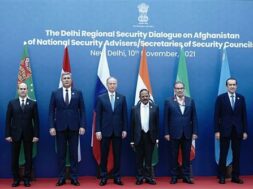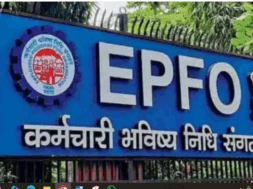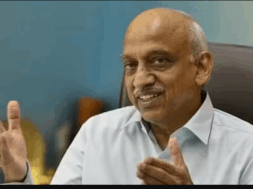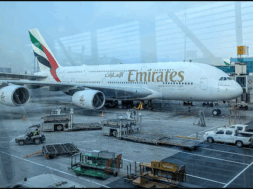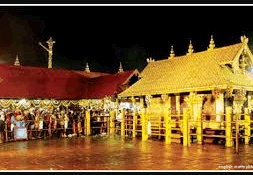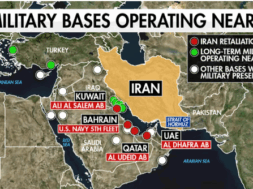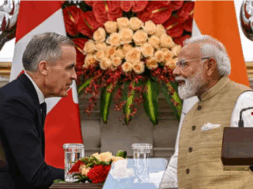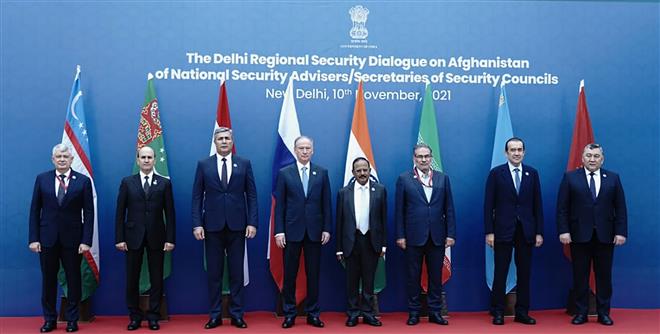
Afghanistan: Delhi Declaration Calls for Keeping Afghan Territory Free from “All Terror Activities”
Manas Dasgupta
NEW DELHI, Nov 10: The National Security Advisors of eight countries on Wednesday adopted the “Delhi Declarations” on the Regional Security Dialogue on Afghanistan called for keeping the Afghan territory free from “sheltering, training or financing any terrorist activities” and make efforts to ensure that Afghanistan remained “peaceful, secure and stable.”
The joint statement – the Delhi Declaration on Afghanistan – said the eight participating nations, who were represented by their respective national security advisors, discussed the evolving Afghan situation, especially the global ramifications following the Taliban’s takeover in August.
The regional security summit hosted by India, which was chaired by the Indian NSA Ajit Doval, paid special attention to the current political situation in Afghanistan, the statement said, adding that threats from terrorism, radicalisation and drug trafficking were also discussed.
The eight nations – India, Russia, Iran, Kazakhstan, Kyrgyzstan, Uzbekistan, Turkmenistan, and Tajikistan – also underlined the need to offer Afghanistan all possible humanitarian assistance. Pakistan and China, which were also invited for the summit, did not attend. While Pakistan had rejected India’s offer to attend it right from the beginning accusing India of being a “spoiler in the region,” China backed out at the last moment citing “scheduling reasons” as the cause for its absence.
All countries “reaffirmed their firm commitment to combat terrorism in all its forms and manifestations, including its financing, dismantling of terrorist infrastructure and countering radicalisation, to ensure Afghanistan would never become a safe haven for global terrorism.”
Expressing “deep concern” for the Afghan people and the “deteriorating socio-economic and humanitarian situation (that) underlined the need to provide urgent assistance”, the Delhi Declaration also said it was critical to form “an open and truly inclusive government that represents the will of all of the people of Afghanistan and has representation from all sections of their society.”
The talks also called for providing humanitarian assistance in an unimpeded, direct and assured manner to Afghanistan and that the assistance was distributed within the country in a non-discriminatory manner across all sections of Afghan society. The declaration also said the officials reiterated strong support for a peaceful, secure and stable Afghanistan while emphasising the respect for sovereignty, unity and territorial integrity and non-interference in its internal affairs.
It said they also expressed deep concern over the suffering of the Afghan people arising from the security situation in Afghanistan and condemned the terrorist attacks in Kunduz, Kandahar and Kabul. They specifically emphasised that Afghan territory should not be used for sheltering, training, planning or financing any terrorist acts.
The eight security advisors also emphasised the “importance of ensuring the fundamental rights of women” as well as that of children and minority communities and called for steps to ensure that the fundamental rights of women, children and minority communities in Afghanistan were not violated. The participating nations discussed the evolving situation in Afghanistan, its regional and global ramifications. The joint declaration also underscored the need to help Afghanistan contain COVID-19.
Earlier, Ajit Doval, called for close consultations and greater cooperation and coordination among nations of the region on the Afghan situation. “These have important implications not only for the people of Afghanistan but also for its neighbours and the region,” Doval said in his opening remarks, adding, “I am confident our deliberations will be productive, useful and will contribute to help the people in Afghanistan.”
This is for the first time all central Asian countries – Tajikistan, Kyrgyzstan, Kazakhstan, Uzbekistan, and Turkmenistan – and not just Afghanistan’s immediate neighbours, are participating in this dialogue. Previous editions (2018 and 2019) of this dialogue were hosted by Iran.
Doval said India had been keenly observing the unfolding situation in Afghanistan and the time had come for close cooperation and consultation among the regional countries for the security of all around Afghanistan. Secretary of the Security Council of the Russian Federation Nikolai P. Patrushev said dialogue mechanisms “should not complicate” the unfolding situation in the Taliban-controlled Afghanistan.
“This is the third meeting of the process that was initiated by Iran in 2018. We had the second meeting there as well. We are grateful to Iran for that. We are meeting today to discuss matters related to Afghanistan. These have important implications not only for the people of Afghanistan but also for its neighbours and the region. This is a time for close consultation amongst us and greater cooperation, interaction and coordination among the regional countries,” Doval said initiating the discussion.
This is the first meeting of the security heads of these countries that India is hosting since the Taliban took power in August after dislodging the Government of President Ashraf Ghani. Doval was accompanied in the meeting by Samant Goel, head of the Research and Analysis Wing, Foreign Secretary Harsh Vardhan Shringla and other Indian diplomats who have been part of Afghanistan-related initiatives in recent months.
Addressing the meeting after Doval, Rear Admiral Ali Shamkhani, Secretary of Supreme National Security Council of Iran, said there was a need to establish an inclusive Government in Afghanistan. “We will be able to discuss bilateral and multilateral affairs and the issues that have destroyed Afghanistan. The solution comes only through the formation of an inclusive Government with the participation of all ethnic groups,” said Shamkhani highlighting that the meeting would help focus on the “force” that could attain that goal.
Karim Massimov, Chairman of the National Security Committee of Kazakhstan, highlighted the many obstacles that prevent the formation of an “effective Government” in Afghanistan. “We are strongly concerned with the appearance of the Central Asian fighters [in Afghanistan]. It’s necessary to increase humanitarian assistance for Afghan people. It is highly important to increase concrete actions,” Massimov said.
Kyrgyz Republic’s Marat Imankulov raised the possibility of terrorism spreading from the territory of Afghanistan and said “We need to extend help to the Afghan people.” The Russian representative praised the role of various regional dialogue mechanisms that had been framed to deal with the political situation in Afghanistan. However, he appeared to favour, the Moscow consultation which he praised for “broad participation” by all sides.
“Such dialogue mechanisms should not complicate the work of each other but rather complement each other. The Moscow format of consultation on Afghanistan retains its important potential because of the broad participation of the stakeholders,” Patrushev said asking for stability in the region around Afghanistan. “Today we will be able to discuss common measures on ensuring national security and maintaining regional stability,” he said.
